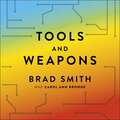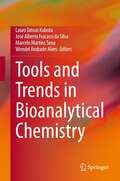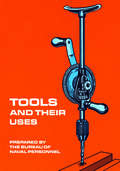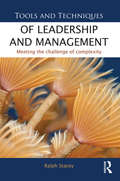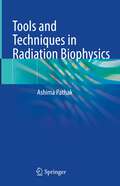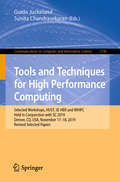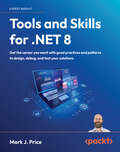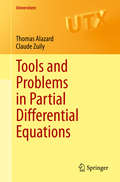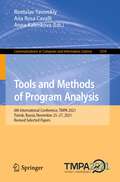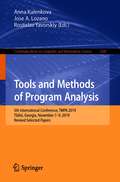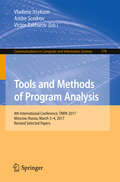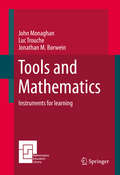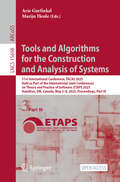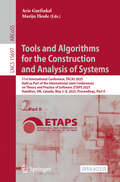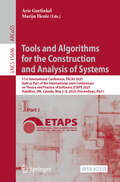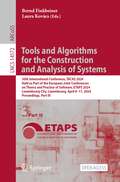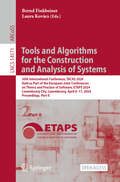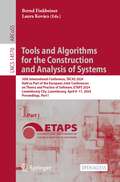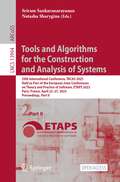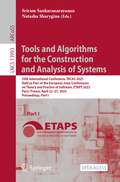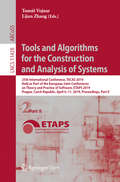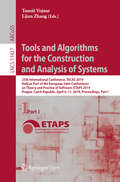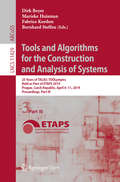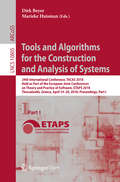- Table View
- List View
Tools and Weapons: The Promise and the Peril of the Digital Age
by Brad Smith Carol Ann BrowneWith a foreword from Bill GatesFrom Microsoft's President and one of the tech industry's wisest thinkers, a frank and thoughtful reckoning with how to balance enormous promise and existential risk as the digitization of everything accelerates.__________Microsoft President Brad Smith operates by a simple core belief: when your technology changes the world, you bear a responsibility to help address the world you have helped create. This might seem uncontroversial, but it flies in the face of a tech sector long obsessed with rapid growth and sometimes on disruption as an end in itself. Now, though, we have reached an inflection point: Silicon Valley has moved fast and it has broken things. A new understanding has emerged that companies that create technology must accept greater responsibility for the future. And governments will need to regulate technology by moving faster and catching up with the pace of innovation that is impacting our communities and changing the world.In Tools and Weapons, Brad Smith takes us into the cockpit of one of the world's largest and most powerful tech companies as it finds itself in the middle of some of the thorniest emerging issues of our time. These are challenges that come with no pre-existing playbook, including privacy, cybercrime and cyberwar, social media, the moral conundrums of AI, big tech's relationship to inequality and the challenges for democracy, far and near. While in no way a self-glorifying "Microsoft memoir," the book opens up the curtain remarkably wide onto some of the company's most crucial recent decision points, as it strives to protect the hopes technology offers against the very real threats it also presents. Every tool can be a weapon in the wrong person's hands, and companies are being challenged in entirely new ways to embrace the totality of their responsibilities. We have moved from a world in which Silicon Valley could take no prisoners to one in which tech companies and governments must work together to address the challenges and adapt to the changes technology has unleashed. There are huge ramifications to be thought through, and Brad Smith provides a marvellous and urgently necessary contribution to that effort.__________In Tools and Weapons, Brad Smith takes us behind the scenes on some of the biggest stories to hit the tech industry in the past decade. From Edward Snowden's NSA leak to the NHS WannaCry ransomware attack, this book is essential reading to understand what's happening in the world around us.(P) 2019 Hodder & Stoughton Ltd
Tools and Trends in Bioanalytical Chemistry
by Lauro Tatsuo Kubota José Alberto Fracassi da Silva Marcelo Martins Sena Wendel Andrade AlvesThis textbook covers the main tools and techniques used in bioanalysis, provides an overview of their principles, and offers several examples of their application and future trends in diagnosis.Chapters from expert contributors explore the role of bioanalysis in different areas such as biochemistry, physiology, forensics, and clinical diagnosis, including topics from sampling/sample preparation, chemometrics in bioanalysis to the latest techniques used in the field. Particular attention is given to the recent advances in the application of mass spectrometry, NMR, electrochemical methods and separation techniques in bioanalysis. Readers will also find more about the application of microchip-based devices and analytical microarrays. This textbook will appeal to graduate/advanced undergraduate students in Chemistry, Biology, Biochemistry, Pharmacy, and Chemical Engineering. It is also a useful resource for researchers and professionals working in the fields of biomedicine and veterinary sciences, with clear explanations and examples of how the different bioanalytical devices are applied for clinical diagnosis.
Tools and Their Uses
by U.S. Bureau of Naval PersonnelDo you have trouble with tools — find that they wear out too quickly, find that you can't decide which tools to buy or which tools to use for a specific job, find that little things continually go wrong? The only way to learn to use tools, of course, is by using them, but first you have to know which tools to use and why.This manual, originally prepared for the use of naval personnel, was designed to present the basic hand and power tools that the ordinary person is likely to use. Through a wealth of diagrams, clear explanations, safety tips, and operating instructions you will soon learn the basics of choosing tools and using them as they were meant to be used. Nearly every hand tool you are likely to use around the house is described in the first chapter: hammers, wrenches, screwdrivers, wood saws, planes, wood chisels, metal chisels, dies, drills, files, hacksaws, punches, reamers, taps, clamps, vises, pliers, knives. Chapter two covers the common power tools: drills, grinders, sanders. Chapter three covers measuring tools from rules and tapes to calipers, micrometers, and squares with detailed instructions on how to use each one. Chapter four describes the common nails, screws, bolts, nuts, rivets, and other fasteners you are likely to use. Chapter five describes grinders and shows how to sharpen and care for screwdrivers, chisels, drills, and snips. The final two chapters cover such miscellaneous tasks and tools as metal cutting operations, stripping insulated wire, and soldering techniques.By the time you finish you should know the names, general uses, and correct operation of all the basic tools, fasteners, and measuring devices you are likely to need around the house. You should be able to select tools for a basic kit for doing simple home repairs. And you should be confident in beginning to use tools for yourself to perform all those simple but necessary repair jobs.
Tools and Techniques of Leadership and Management: Meeting the Challenge of Complexity
by Ralph StaceyMany of today’s books on the tools and techniques of leadership and management provide descriptions of long lists for use in decision-making, leading, coaching and project management. This book takes a completely different approach. It contests the claims that the tools and techniques are based on evidence and explains why human activities of leading and managing are simply not amenable to scientific proof and consequently, why long-term futures of organizations are unpredictable. The book undertakes a critical exploration of just what these tools and techniques are about; showing that while they may lead to competent performance they cannot go further to expert performance because expertise involves going beyond rules and procedures. Ralph Stacey investigates the many questions that are thrown up as a result of this new approach. Questions such as: How do we apply this new way of thinking? What are the practical tools and techniques it gives us? What is the role of leaders in an unpredictable world? How does complexity affect the way organizations are structured and function? This book will be relevant to students on courses and modules that deal with leadership, decision-making and organizational development and behaviour as well as professional leaders and managers who want to develop their own understanding and techniques.
Tools and Techniques in Radiation Biophysics
by Ashima PathakThis textbook describes the study of radiation, covering the basic concepts and their advanced applications, and highlights the handling of radioisotopes and radiation measurements using various instruments. The book also focuses on the effects and up-to-date applications of radiation on biological systems and their use in diagnosing and treating various diseases. Chapters provide an easy understanding of the subject matter with the help of self-explanatory, well-illustrated figures and easy-to-grasp language. “Tools and Techniques in Radiation Biophysics” is designed for undergraduate and post-graduate studying radiation Biophysics as one of the major courses in medical physics, nuclear medicine, biophysics, and other applied sciences. The multi-disciplinary approach of this book facilitates learning and a deep understanding of the concepts and helps the readers develop an interest in the subject so that they can pursue their careers efficiently in this field. Researchers and lecturers will value this book to enhance their knowledge and clarify queries.
Tools and Techniques for High Performance Computing: Selected Workshops, HUST, SE-HER and WIHPC, Held in Conjunction with SC 2019, Denver, CO, USA, November 17–18, 2019, Revised Selected Papers (Communications in Computer and Information Science #1190)
by Sunita Chandrasekaran Guido JuckelandThis book constitutes the refereed proceedings of 3 workshops co-located with International Conference for High Performance Computing, Networking, Storage, and Analysis, SC19, held in Denver, CO, USA, in November 2019. The 12 full papers presented in this proceedings feature the outcome of the 6th Annual Workshop on HPC User Support Tools, HUST 2019, International Workshop on Software Engineering for HPC-Enabled Research, SE-HER 2019, and Third Workshop on Interactive High-Performance Computing, WIHPC 2019.
Tools and Skills for .NET 8: Get the career you want with good practices and patterns to design, debug, and test your solutions
by Mark J. PriceElevate your career by mastering key .NET tools and skills, including debugging, source code management, testing, cloud-native development, intelligent apps and more. Purchase of the print or Kindle book includes a free PDF eBook.Key FeaturesCoverage of key .NET tools and skills including refactoring, source code management, debugging, memory troubleshooting, and morePractical guidance on using code editors effectively, implementing best practices, and protecting dataExplore cutting-edge techniques like building intelligent apps, cloud native development with .NET Aspire, and Docker containerizationBook DescriptionUnlock the full potential of .NET development with Tools and Skills for .NET 8. Dive into source code management using Git and learn how to navigate projects while ensuring version control. Discover advanced debugging techniques and troubleshooting strategies to identify and resolve issues, and gain practical insights on documenting your code, APIs, and services, fostering project clarity and maintainability. Delve into the world of cryptography, ensuring confidentiality and integrity throughout your development lifecycle. Elevate your skills as you explore cutting-edge topics such as building intelligent apps using custom LLM-based chat services, mastering dependency injection, optimizing performance through testing, and Docker containerization. Harness the power of cloud-native development with .NET Aspire, unlocking the benefits of modern cloud platforms. With guidance on software architecture best practices, this book empowers you to build robust, scalable and maintainable applications. Advance your career with invaluable insights on job readiness and interview preparation, positioning yourself as a top-tier candidate in today's competitive job market. Whether you're a seasoned .NET professional or an aspiring developer looking to enhance your skills, this book is your ultimate companion on the journey to .NET mastery.What you will learnMake the most of code editor tools for efficient developmentLearn advanced debugging techniques and troubleshooting strategiesUnderstand how to protect data and applications using cryptographyBuild a custom LLM-based chat serviceDiscover how to master dependency injectionOptimize performance through benchmarking and testingDelve into cloud-native development using .NET AspireAdvance your career with advice on job readiness and interviewsWho this book is for.NET professionals seeking to enhance their expertise, as well as aspiring developers aiming to advance their careers in the field. This book caters to individuals eager to master essential .NET tools, refine their development practices, explore advanced techniques and cutting-edge tools, and prepare themselves for job opportunities and interviews in the competitive landscape of .NET development
Tools and Problems in Partial Differential Equations (Universitext)
by Thomas Alazard Claude ZuilyThis textbook offers a unique learning-by-doing introduction to the modern theory of partial differential equations.Through 65 fully solved problems, the book offers readers a fast but in-depth introduction to the field, covering advanced topics in microlocal analysis, including pseudo- and para-differential calculus, and the key classical equations, such as the Laplace, Schrödinger or Navier-Stokes equations. Essentially self-contained, the book begins with problems on the necessary tools from functional analysis, distributions, and the theory of functional spaces, and in each chapter the problems are preceded by a summary of the relevant results of the theory.Informed by the authors' extensive research experience and years of teaching, this book is for graduate students and researchers who wish to gain real working knowledge of the subject.
Tools and Methods of Program Analysis: 6th International Conference, TMPA 2021, Tomsk, Russia, November 25–27, 2021, Revised Selected Papers (Communications in Computer and Information Science #1559)
by Ana Rosa Cavalli Anna Kalenkova Rostislav YavorskiyThis book constitutes the refereed proceedings of the 6th International Conference on Tools and Methods of Program Analysis, TMPA 2021, held in Tomsk, Russia, during November 25–27, 2021.The 15 full papers and 3 short papers included in this book were carefully reviewed and selected from 45 submissions. They focus on various aspects of application of modern methods of data science to the analysis of software quality.
Tools and Methods of Program Analysis: 5th International Conference, TMPA 2019, Tbilisi, Georgia, November 7–9, 2019, Revised Selected Papers (Communications in Computer and Information Science #1288)
by Anna Kalenkova Jose A. Lozano Rostislav YavorskiyThis book constitutes the refereed proceedings of the 5th International Conference on Tools and Methods for Program Analysis, TMPA 2019, held in Tbilisi, Georgia, in November 2019.The 14 revised full papers and 2 revised short papers presented together with one keynote paper were carefully reviewed and selected from 41 submissions. The papers deal with topics such as software test automation, static program analysis, verification, dynamic methods of program analysis, testing and analysis of parallel and distributed systems, testing and analysis of high-load and high-availability systems, analysis and verification of hardware and software systems, methods of building quality software, tools for software analysis, testing and verification.
Tools and Methods of Program Analysis
by Vladimir Itsykson Andre Scedrov Victor ZakharovThis book constitutes the refereed proceedings of the 4th International Conference on Tools and Methods for Program Analysis, TMPA 2017, Moscow, Russia, March 3-4, 2017. The 12 revised full papers and 5 revised short papers presented together with three abstracts of keynote talks were carefully reviewed and selected from 51 submissions. The papers deal with topics such as software test automation, static program analysis, verification, dynamic methods of program analysis, testing and analysis of parallel and distributed systems, testing and analysis of high-load and high-availability systems, analysis and verification of hardware and software systems, methods of building quality software, tools for software analysis, testing and verification.
Tools and Mathematics
by Jonathan M. Borwein Luc Trouche John MonaghanThis book is an exploration of tools and mathematics and issues in mathematics education related to tool use. The book has five parts. The first part reflects on doing a mathematical task with different tools, followed by a mathematician's account of tool use in his work. The second considers prehistory and history: tools in the development from ape to human; tools and mathematics in the ancient world; tools for calculating; and tools in mathematics instruction. The third part opens with a broad review of technology and intellectual trends, circa 1970, and continues with three case studies of approaches in mathematics education and the place of tools in these approaches. The fourth part considers issues related to mathematics instructions: curriculum, assessment and policy; the calculator debate; mathematics in the real world; and teachers' use of technology. The final part looks to the future: task and tool design and new forms of activity via connectivity and computer games.
Tools and Algorithms for the Construction and Analysis of Systems: 31st International Conference, TACAS 2025, Held as Part of the International Joint Conferences on Theory and Practice of Software, ETAPS 2025, Hamilton, ON, Canada, May 3–8, 2025, Proceedings, Part III (Lecture Notes in Computer Science #15698)
by Arie Gurfinkel Marijn HeuleThe open access book set LNCS 15696, 15697 and 15698 constitutes the proceedings of the 31st International Conference on Tools and Algorithms for the Construction and Analysis of Systems, TACAS 2025, which was held as part of the International Joint Conferences on Theory and Practice of Software, ETAPS 2025, during May 3-8, 2025, in Hamilton, Canada. The 46 papers presented were carefully reviewed and selected from 148 submissions. The proceedings also include 14 papers from the Software Verification competition which was held as part of TACAS. The papers were organized in topical sections as follows: Part I: Program analysis, ATP and rewriting; model checking; LTL; verification; Part II: SAT and SMT solving; proofs and certificates; synthesis; equivalence checking; games; Part III: Verification; quantum and GPU; 14th Competition on Software Verification, SV-COMP 2025.
Tools and Algorithms for the Construction and Analysis of Systems: 31st International Conference, TACAS 2025, Held as Part of the International Joint Conferences on Theory and Practice of Software, ETAPS 2025, Hamilton, ON, Canada, May 3–8, 2025, Proceedings, Part II (Lecture Notes in Computer Science #15697)
by Arie Gurfinkel Marijn HeuleThe open access book set LNCS 15696, 15697 and 15698 constitutes the proceedings of the 31st International Conference on Tools and Algorithms for the Construction and Analysis of Systems, TACAS 2025, which was held as part of the International Joint Conferences on Theory and Practice of Software, ETAPS 2025, during May 3-8, 2025, in Hamilton, Canada. The 46 papers presented were carefully reviewed and selected from 148 submissions. The proceedings also include 14 papers from the Software Verification competition which was held as part of TACAS. The papers were organized in topical sections as follows: Part I: Program analysis, ATP and rewriting; model checking; LTL; verification; Part II: SAT and SMT solving; proofs and certificates; synthesis; equivalence checking; games; Part III: Verification; quantum and GPU; 14th Competition on Software Verification, SV-COMP 2025.
Tools and Algorithms for the Construction and Analysis of Systems: 31st International Conference, TACAS 2025, Held as Part of the International Joint Conferences on Theory and Practice of Software, ETAPS 2025, Hamilton, ON, Canada, May 3–8, 2025, Proceedings, Part I (Lecture Notes in Computer Science #15696)
by Arie Gurfinkel Marijn HeuleThe open access book set LNCS 15696, 15697 and 15698 constitutes the proceedings of the 31st International Conference on Tools and Algorithms for the Construction and Analysis of Systems, TACAS 2025, which was held as part of the International Joint Conferences on Theory and Practice of Software, ETAPS 2025, during May 3-8, 2025, in Hamilton, Canada. The 46 papers presented were carefully reviewed and selected from 148 submissions. The proceedings also include 14 papers from the Software Verification competition which was held as part of TACAS. The papers were organized in topical sections as follows: Part I: Program analysis, ATP and rewriting; model checking; LTL; verification; Part II: SAT and SMT solving; proofs and certificates; synthesis; equivalence checking; games; Part III: Verification; quantum and GPU; 14th Competition on Software Verification, SV-COMP 2025.
Tools and Algorithms for the Construction and Analysis of Systems: 30th International Conference, TACAS 2024, Held as Part of the European Joint Conferences on Theory and Practice of Software, ETAPS 2024, Luxembourg City, Luxembourg, April 6–11, 2024, Proceedings, Part III (Lecture Notes in Computer Science #14572)
by Bernd Finkbeiner Laura KovácsThe open access book 3-volume set LNCS 14570-14573 constitutes the proceedings of the 30th International Conference on Tools and Algorithms for the Construction and Analysis of Systems, TACAS 2024, which was held as part of the European Joint Conferences on Theory and Practice of Software, ETAPS 2024, during April 6-11, 2024, in Luxembourg.The 53 full papers and 16 short SVComp contributions included in these proceedings were carefully reviewed and selected from 159 submissions. They were organized in topical sections as follows:Part I: STA and SMT solving; synthesis; logic and decidability; program analysis and proofs; proof checking; Part II: Model Checking; automata and learning; software verification; probabilistic systems; simulations; Part III: Neural networks; testing and verification; games; concurrency; SV-Comp 2024.
Tools and Algorithms for the Construction and Analysis of Systems: 30th International Conference, TACAS 2024, Held as Part of the European Joint Conferences on Theory and Practice of Software, ETAPS 2024, Luxembourg City, Luxembourg, April 6–11, 2024, Proceedings, Part II (Lecture Notes in Computer Science #14571)
by Bernd Finkbeiner Laura KovácsThe open access book 3-volume set LNCS 14570-14573 constitutes the proceedings of the 30th International Conference on Tools and Algorithms for the Construction and Analysis of Systems, TACAS 2024, which was held as part of the European Joint Conferences on Theory and Practice of Software, ETAPS 2024, during April 6-11, 2024, in Luxembourg.The 53 full papers and 16 short SVComp contributions included in these proceedings were carefully reviewed and selected from 159 submissions. They were organized in topical sections as follows:Part I: STA and SMT solving; synthesis; logic and decidability; program analysis and proofs; proof checking; Part II: Model Checking; automata and learning; software verification; probabilistic systems; simulations; Part III: Neural networks; testing and verification; games; concurrency; SV-Comp 2024.
Tools and Algorithms for the Construction and Analysis of Systems: 30th International Conference, TACAS 2024, Held as Part of the European Joint Conferences on Theory and Practice of Software, ETAPS 2024, Luxembourg City, Luxembourg, April 6–11, 2024, Proceedings, Part I (Lecture Notes in Computer Science #14570)
by Bernd Finkbeiner Laura KovácsThe open access book 3-volume set LNCS 14570-14573 constitutes the proceedings of the 30th International Conference on Tools and Algorithms for the Construction and Analysis of Systems, TACAS 2024, which was held as part of the European Joint Conferences on Theory and Practice of Software, ETAPS 2024, during April 6-11, 2024, in Luxembourg.The 53 full papers and 16 short SVComp contributions included in these proceedings were carefully reviewed and selected from 159 submissions. They were organized in topical sections as follows:Part I: STA and SMT solving; synthesis; logic and decidability; program analysis and proofs; proof checking; Part II: Model Checking; automata and learning; software verification; probabilistic systems; simulations; Part III: Neural networks; testing and verification; games; concurrency; SV-Comp 2024.
Tools and Algorithms for the Construction and Analysis of Systems: 29th International Conference, TACAS 2023, Held as Part of the European Joint Conferences on Theory and Practice of Software, ETAPS 2022, Paris, France, April 22–27, 2023, Proceedings, Part II (Lecture Notes in Computer Science #13994)
by Natasha Sharygina Sriram SankaranarayananThis open access book constitutes the proceedings of the 29th International Conference on Tools and Algorithms for the Construction and Analysis of Systems, TACAS 2023, which was held as part of the European Joint Conferences on Theory and Practice of Software, ETAPS 2023, during April 22-27, 2023, in Paris, France. The 56 full papers and 6 short tool demonstration papers presented in this volume were carefully reviewed and selected from 169 submissions. The proceedings also contain 1 invited talk in full paper length, 13 tool papers of the affiliated competition SV-Comp and 1 paper consisting of the competition report. TACAS is a forum for researchers, developers, and users interested in rigorously based tools and algorithms for the construction and analysis of systems. The conference aims to bridge the gaps between different communities with this common interest and to support them in their quest to improve the utility, reliability, flexibility, and efficiency of tools and algorithms for building computer-controlled systems.
Tools and Algorithms for the Construction and Analysis of Systems: 29th International Conference, TACAS 2023, Held as Part of the European Joint Conferences on Theory and Practice of Software, ETAPS 2022, Paris, France, April 22–27, 2023, Proceedings, Part I (Lecture Notes in Computer Science #13993)
by Natasha Sharygina Sriram SankaranarayananThis open access book constitutes the proceedings of the 29th International Conference on Tools and Algorithms for the Construction and Analysis of Systems, TACAS 2023, which was held as part of the European Joint Conferences on Theory and Practice of Software, ETAPS 2023, during April 22-27, 2023, in Paris, France.The 56 full papers and 6 short tool demonstration papers presented in this volume were carefully reviewed and selected from 169 submissions. The proceedings also contain 1 invited talk in full paper length, 13 tool papers of the affiliated competition SV-Comp and 1 paper consisting of the competition report. TACAS is a forum for researchers, developers, and users interested in rigorously based tools and algorithms for the construction and analysis of systems. The conference aims to bridge the gaps between different communities with this common interest and to support them in their quest to improve the utility, reliability, flexibility, and efficiency of tools and algorithms for building computer-controlled systems.
Tools and Algorithms for the Construction and Analysis of Systems: 25th International Conference, TACAS 2019, Held as Part of the European Joint Conferences on Theory and Practice of Software, ETAPS 2019, Prague, Czech Republic, April 6–11, 2019, Proceedings, Part II (Lecture Notes in Computer Science #11428)
by Tomáš Vojnar Lijun ZhangThis book is Open Access under a CC BY licence. The LNCS 11427 and 11428 proceedings set constitutes the proceedings of the 25th International Conference on Tools and Algorithms for the Construction and Analysis of Systems, TACAS 2019, which took place in Prague, Czech Republic, in April 2019, held as part of the European Joint Conferences on Theory and Practice of Software, ETAPS 2019. The total of 42 full and 8 short tool demo papers presented in these volumes was carefully reviewed and selected from 164 submissions. The papers are organized in topical sections as follows: Part I: SAT and SMT, SAT solving and theorem proving; verification and analysis; model checking; tool demo; and machine learning. Part II: concurrent and distributed systems; monitoring and runtime verification; hybrid and stochastic systems; synthesis; symbolic verification; and safety and fault-tolerant systems.
Tools and Algorithms for the Construction and Analysis of Systems: 25th International Conference, TACAS 2019, Held as Part of the European Joint Conferences on Theory and Practice of Software, ETAPS 2019, Prague, Czech Republic, April 6–11, 2019, Proceedings, Part I (Lecture Notes in Computer Science #11427)
by Tomáš Vojnar Lijun ZhangThis book is Open Access under a CC BY licence. The LNCS 11427 and 11428 proceedings set constitutes the proceedings of the 25th International Conference on Tools and Algorithms for the Construction and Analysis of Systems, TACAS 2019, which took place in Prague, Czech Republic, in April 2019, held as part of the European Joint Conferences on Theory and Practice of Software, ETAPS 2019. The total of 42 full and 8 short tool demo papers presented in these volumes was carefully reviewed and selected from 164 submissions. The papers are organized in topical sections as follows: Part I: SAT and SMT, SAT solving and theorem proving; verification and analysis; model checking; tool demo; and machine learning. Part II: concurrent and distributed systems; monitoring and runtime verification; hybrid and stochastic systems; synthesis; symbolic verification; and safety and fault-tolerant systems.
Tools and Algorithms for the Construction and Analysis of Systems: 25 Years of TACAS: TOOLympics, Held as Part of ETAPS 2019, Prague, Czech Republic, April 6–11, 2019, Proceedings, Part III (Lecture Notes in Computer Science #11429)
by Fabrice Kordon Marieke Huisman Bernhard Steffen Dirk BeyerThis book is Open Access under a CC BY licence. This book, LNCS 11429, is part III of the proceedings of the 25th International Conference on Tools and Algorithms for the Construction and Analysis of Systems, TACAS 2019, which took place in Prague, Czech Republic, in April 2019, held as part of the European Joint Conferences on Theory and Practice of Software, ETAPS 2019. It's a special volume on the occasion of the 25 year anniversary of TACAS.
Tools and Algorithms for the Construction and Analysis of Systems: 25 Years of TACAS: TOOLympics, Held as Part of ETAPS 2019, Prague, Czech Republic, April 6–11, 2019, Proceedings, Part III (Lecture Notes in Computer Science #11429)
by Fabrice Kordon Marieke Huisman Bernhard Steffen Dirk BeyerThis book is Open Access under a CC BY licence. This book, LNCS 11429, is part III of the proceedings of the 25th International Conference on Tools and Algorithms for the Construction and Analysis of Systems, TACAS 2019, which took place in Prague, Czech Republic, in April 2019, held as part of the European Joint Conferences on Theory and Practice of Software, ETAPS 2019. It's a special volume on the occasion of the 25 year anniversary of TACAS.
Tools and Algorithms for the Construction and Analysis of Systems: 24th International Conference, Tacas 2018, Held As Part Of The European Joint Conferences On Theory And Practice Of Software, Etaps 2018, Thessaloniki, Greece, April 14-20, 2018. Proceedings, Part I (Lecture Notes in Computer Science #10805)
by Marieke Huisman Dirk BeyerThis book is Open Access under a CC BY licence. The LNCS 10805 and 10806 proceedings set constitutes the proceedings of the 24th International Conference on Tools and Algorithms for the Construction and Analysis of Systems, TACAS 2018, which took place in Thessaloniki, Greece, in April 2018, held as part of the European Joint Conference on Theory and Practice of Software, ETAPS 2018. The total of 43 full and 11 short papers presented in these volumes was carefully reviewed and selected from 154submissions. The papers are organized in topical sections as follows: Part I: theorem proving; SAT and SMT I; deductive verification; software verification and optimization; model checking; and machine learning. Part II: concurrent and distributed systems; SAT and SMT II; security and reactive systems; static and dynamic program analysis; hybrid and stochastic systems; temporal logic and mu-calculus; 7th Competition on Software Verification – SV-COMP.
